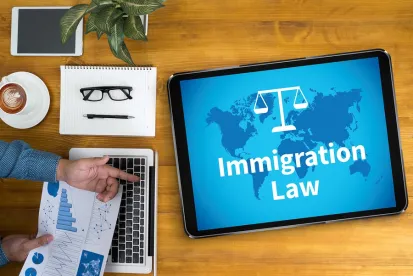USCIS Announces Implementation of Its H-1B Electronic Registration Tool
After several months of vetting public commentary, U.S. Citizenship and Immigration Services (“USCIS”) will roll out its H-1B electronic registration tool (“ERT”) to replace the agency’s previous procedure in processing H-1B cap lottery petitions. USCIS has already completed its initial pilot testing of the ERT system. According to USCIS Deputy Director Mark Koumans, “The agency completed a successful pilot testing phase, which included sessions with industry representatives, and implementation of the registration system will further the goal of modernizing USCIS from a paper-based to an online-filing agency.”
Previously, with regard to an H-1B cap lottery for a fiscal year, USCIS would begin accepting H-1B cap cases received during the first week of April for that year. During that week, USCIS would accept fully completed H-1B petitions from U.S. employers wishing to hire non-U.S. employees who never previously received H-1B employment. For the past several years, more petitions were filed than H-1B visas were available. In total, USCIS does not issue more than 85,000 new H-1Bs each year. When the amount of H-1B petitions filed exceeds the available H-1B cap numbers, USCIS completes a random computer-generated lottery. The agency’s computer randomly selects the first 65,000 H-1B petitions under the regular cap and then randomly chooses the remaining 20,000 under the U.S. master’s degree cap. For those not selected, USCIS returns the fully completed H-1B petition, with uncashed filing fee checks, to the relevant employer or its legal representative.
For the H-1B cap set for fiscal year 2021, USCIS will replace the above process with its new H-1B ERT system. Under the new system, a company or its representatives will register the company and the individual H-1B employee to be sponsored with the H-1B ERT system and thereafter pay a $10 registration fee. Although no actual filing of a fully completed H-1B petition with USCIS takes place during the first week of April, the H-1B ERT registration must be completed between March 1 and March 20, 2020. Once the deadline closes, USCIS will announce its lottery and pick the names of companies and their employees that were registered within the H-1B ERT system. Those chosen will be given a specified time period to file an actual H-1B petition with filing fees. Those not chosen cannot submit an H-1B petition.
Unfortunately, the H-1B ERT system has not fully been tested with registrants numbering in the hundreds of thousands. The fear is that the system may not be able to handle such volume, which may result in USCIS disregarding the system at the end of March and requiring H-1B employers to begin submitting a large number of H-1B filings before April 1, an extremely short period of time.
USCIS will provide more updates regarding the system, including training, in the coming weeks. Epstein Becker Green will keep you informed about such training.
Staffing Company Agrees to Pay $70,695 Civil Penalty to DOJ for Immigration Discrimination Claims
On December 6, 2019, the U.S. Department of Justice (“DOJ”) announced that Onin Staffing LLC (“Onin”) agreed to pay the DOJ $70,695 in civil fines resulting from the company improperly requesting that its employees provide proof of work authorization. The specific charges resulted from Onin’s office located in McAllen, Texas, where it was requiring proof of work authorization in excess of Form I-9 requirements.
Form I-9 requires that specific types of documents be used to verify the identity and work authorization of all new hires of any U.S. employer within three business days of the new hires’ employment start date. However, the choice of which documents to use in verifying identity and work authorization is solely made by the employee. In Onin’s case, the company required all its non-U.S. citizen employees to provide specific types of document while not imposing similar requirements on its U.S. citizen employees. The DOJ found that the company acted in violation of the anti-discrimination provision of the Immigration and Nationality Act.
Companies should use this case as a reminder to follow Form I-9 requirements and not go beyond what is allowed.
F-1 Immigration Travel Issues to Watch Out for During This Holiday Season
Two years ago, we reported how the “90-day rule” could impact holiday travel by F-1 OPT employees. This holiday season, it is important that employers realize that the rule is still in effect.
In September 2017, the U.S. Department of State (“DOS”) updated its Foreign Affairs Manual (“FAM”) guidance regarding “willful misrepresentations.” Under the FAM, the DOS could claim that a willful misrepresentation occurs when a foreign national (“FN”) enters the United States with a temporary intent visa (i.e., an F-1 student, B-1/B-2 visitors, TN, E-3, etc.) and thereafter files an adjustment of status application for U.S. permanent residency (i.e., a green card) within 90 days of his or her U.S. entry. This is the “90-day rule.”
The DOS’s 90-day rule added a wrinkle by including language that affects changes of status to another nonimmigrant status within 90 days of U.S. entry. While we do not think it likely (because this is DOS guidance and not a U.S. Department of Homeland Security memo), the 90-day rule may arguably include any changes of status from F-1 OPT status to H-1B or any other status that requires approval to engage in the sponsored activities. Under the broad language of the DOS guidance, such change of status requests now could be viewed by the government as willful misrepresentations by the F-1 OPT worker.
Therefore, under this 90-day rule, anyone in F-1 OPT, TN, E-3, H-1B1, O-1, or any other temporary visa status who files a change of status application to another status, such as H-1B, within 90 days of entry into the United States runs the risk that the government may claim that he or she made a willful misrepresentation, and then deny the change of status application on that basis. Even if the application is approved now, the circumstances create an undefined future danger that the employee may (i) be denied an H-1B visa at a U.S. consulate, (ii) be denied H-1B extensions, (iii) be refused U.S. reentry, or (iv) have his or her green card application denied. This is all based on the employee’s imputed willful misrepresentation of his or her nonimmigrant intent resulting from filing an H-1B change of status application within 90 days of entering the United States.





 />i
/>i

